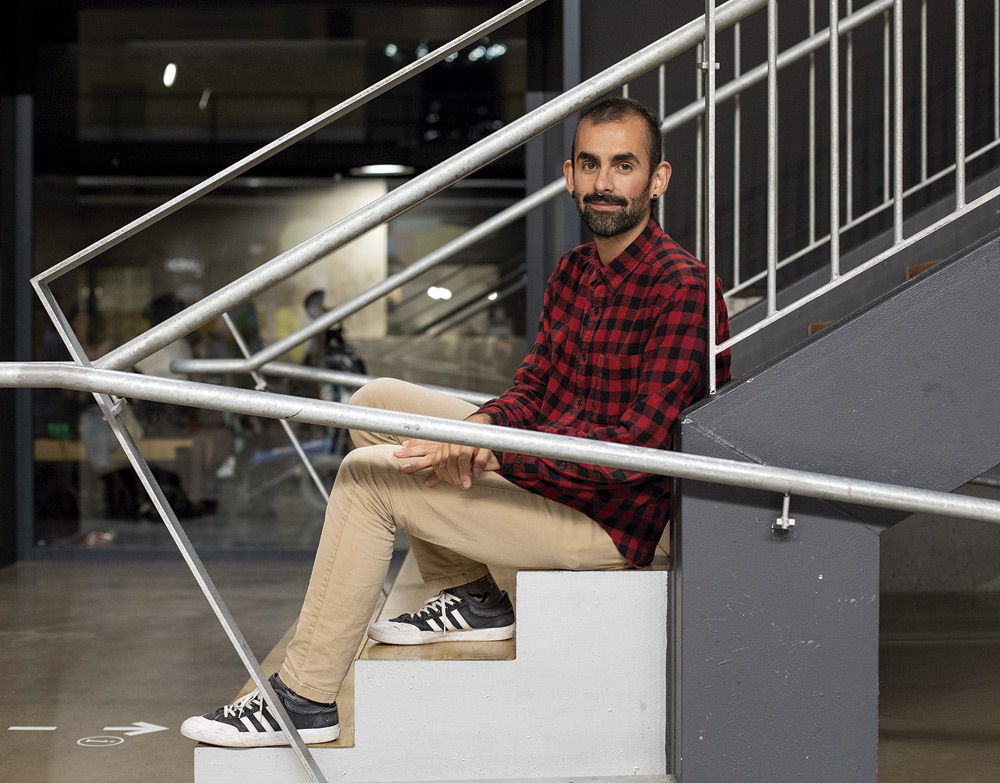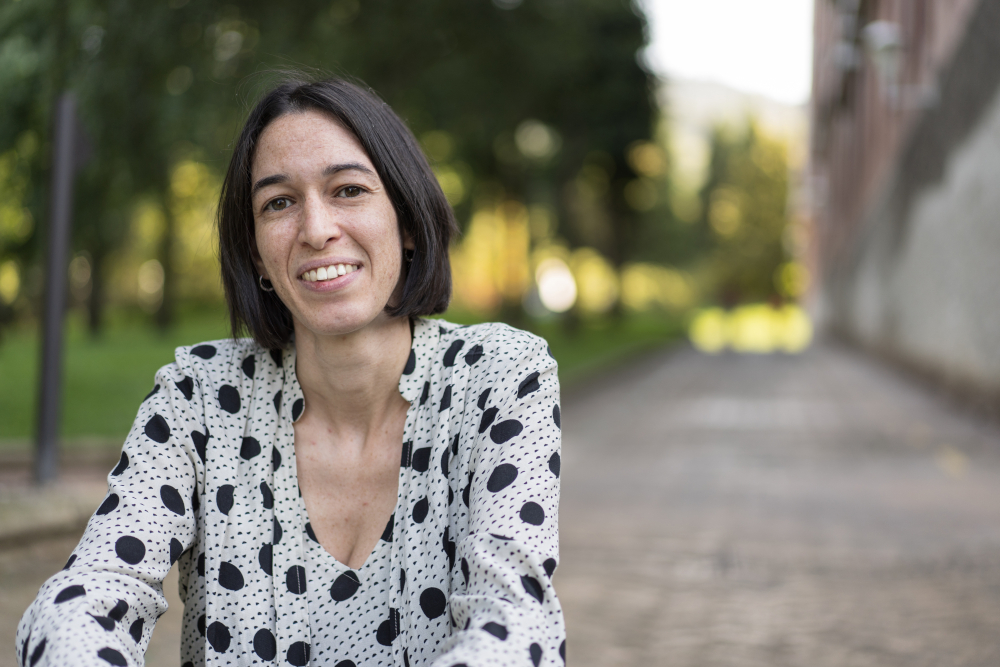"I am interested in the human condition, in Euskal Herria, in Chile, or in New Zealand."
- What is man himself, the wolf or the sheep? What is the deepest impulse, the domain, or submission? Chilean Jota Pizarro has researched in recent years how humans manage and adapt to groups. He lives in Donostia-San Sebastian for the past eight years, and has also traveled around the world. That has helped him a lot, because he has “opened his head” and “has one more point to make comparisons”.

To start with… José Joaquín or Jota?
I prefer the jack. They call me this from a young age. When I was very young, I was always Jota, because I have three names and the first two start with that letter, but then they cut it off.
You were born and raised in Chile. You would tell me a little bit of place, of time…
I was born in Santiago, where I lived until I was 4 years old, with my family, of course, and then we went to the country, our neighbors were very far away, and there I lived very comfortable, with dogs, with animals and with lots of land. In the early years, my father worked the land, but then he started doing other things, and when I started in college, we changed and we went to the town, but it was a very small town. I'm a person from a small town.
Do you have a chance to come back?
If it is possible to try to go back as far as possible, spend the holidays there… If I have time and money, I leave. I often have time, but not money, sometimes money, but not time. I went on vacation the year before and this year I happened to leave because my grandfather died. I had the opportunity and it was a gift. Very nice, after all, they were only two weeks, but I didn't expect them, and I got right into the burial. It looked like a movie.
He's been in Euskal Herria for eight years. What was it like?
For love [laughs]. I met my partner in Chile, she's from here. We met when the race was over, we suddenly got to know about this relationship, and when the time had to pass in Chile was over, we started to think about what we were going to do, and between the two of us we thought I was going to come back. I always wanted to travel, I didn't know where or how, but I knew I would do something. Therefore, Itsaso's plans of life and knowledge had more or less coincided.
You are a learning psychologist and have made your thesis in the field of social psychology. Did you have it clear from the beginning that you wanted to investigate?
I went into the psycho-analysis career, thinking I was going to be a clinical psychologist, I really liked it. Then, when I met social psychology, I fell in love. I met him in Chile, and right there, I decided I wanted to be a psychology professor.
"We're not very cognitive. That theory of ‘Homo economicus’, which believes that we are always processing everything to see how much we gain and how much we lose, is not real.”
What exactly is social psychology? What is the difference between this current and other psychological currents?
It is difficult to say, but normally, if there are social relationships, I see social psychology there: we work a lot on emotions, power, status, acculturation, stereotypes, collective processes... We don't work the individual difference, if it's an open, shy, or pathetic person, that doesn't matter to me. I want to explain, if I take a group of people, in a demonstration or in another collective rite, what processes, mechanisms and results emerge, when you share something with a lot of people.
What would be the difference with sociology?
Very good reflection, I don't know where one ends and where the other begins. I would say that we do more measurements, but I am not very sure that is why the two are distinguished.
What did you measure in your thesis and what conclusions did you draw?
I have studied mostly demonstrations and events with ritualistic elements such as concerts, plays, where some things are expected, buffered… And the conclusion has been that sharing with other people brings good things, because it is a source of self-esteem and you feel faster after participating. I don't mean that these rituals are always positive, because they were also made by the Nazis. They are, above all, positive for the sake of our self-esteem and well-being, and because they help to create networks of solidarity in societies. We need a lot to live and share with other people, and in my thesis I've seen that the emotional part is very important. We're not very cognitive. That theory of Homo economicus that believes that we are always processing everything we gain and what we lose, that is not real, emotions, sensations and how we feel are really real.

How can the things you've worked on be put into practice?
It's my father, especially, who asks me these questions and I don't know how to answer them. Functionally, I don't know what we can do with this knowledge. I'd rather measure processes. Others, in the same way, prefer to make intervention plans, perhaps related to education… It is a line of research that we are doing now, in societies that have experienced conflicts, how to return to normal. In Euskal Herria, for example, with violence, with the victims on both sides, and also in Colombia, we are seeing that these emotions help a lot, not so much to forgive, perhaps not real, but a little to return to normal life. If we share human identity and realize that we are all human, things are going better. Another person may be able to take that knowledge and create intervention plans in schools or in others, but the truth is that what I want is research. I'm interested in the human condition, in Euskal Herria, in Chile, or in New Zealand.
And also in Palestine. Two years ago you tried to get there, right?
I'm in another project and we study the collective memory of people in nations. In this sense, our boss got in touch with a very friendly Palestinian researcher. He came here to see things, and to know what the project was like, and we also tried to go and get into Gaza, but we couldn't pass the blockade. We stayed in Israel for twenty-two days, in Tel Aviv and in the great town of Axkelon, near the border with Gaza.
What was the experience like?
It's very deep, it makes us sad because we can't get in, but on the other hand what we feel there is very rare, the level of tension is very high. You see people everywhere with machine guns, and I always felt very observed. As a social phenomenon, it's very interesting. Politically, it's crap, because there's apartheid, we know that. But if you look scientifically, it's very interesting to see what that shit generates among people: mistrust in institutions, always very much in the discourse, very categorized ...
How did they fix you with people?
All right. We met people who helped us a great deal in trying to enter Gaza and, on the other hand, as is the case in many countries, people want peace. Even if they talk about fear, with a point of hatred, if you pull that rope, you realize that the fachas also have fears, because of family history or the experiences lived... I don’t know, but we are human. That doesn't justify the difference in power, of course, but I like to see complexity, because I don't think there are good people and bad people. I do not think that is the case.
What does it look like?
I don’t know, we’re human… Why do we introduce adjectives to feel better? What I want is, as I said, to learn, to search or to know what human nature is.
You take the Basque very well. What has your language learning process been like?
Pretty fast. I tend to say that thanks to the crew and AEK, I learned Basque. On the one hand, because I went into AEK and I was two years in a row two hours a day, and that helped me a lot. Before that, the crew always told me words, phrases, and when I entered AEK they gave me a period of two months to speak in Spanish, from there everything in Basque, and so it was. It was very hard in a moment, but because of that I learned very quickly, and today I thank him very much.

Euskaraldia, avant la lettre. Knowing you've studied collective rituals, how do you see the rituals of Euskal Herria?
For me, for example, the Gazte Martxa is a ritual of Christ, very nice, the feeling of crossing villages, you are moving… it is very nice. The Korrika itself is very nice, one year I took the witness at the kilometer of the gaztetxe of Antzuola and it was very nice. Here are Christ's rituals: Santa eskeak, sorgin dantza… I don’t see them in Chile. Here are a lot of collective rituals, not just to have a good time, but very much needed.
In recent weeks, the situation of your people is on the surface, and that is how it has come to us in the media. How does it live that events continue so far?
It's very complex, I have a bittersweet sense. On the one hand, I am very glad that things are on. In Chile, we have always said that the upper class does the hardest thing against us, and it's noted in the speech: they say it's our bad luck, that we almost deserve it. If you look at that model, we can think there's nothing to change, but what we're seeing today is pretty. People say it's enough, and I hope something profound happens, if not, we'll stay the same. Many people have a lot to lose, for example, if you're not going to work, you lose a lot, and with the minimum wage you can't live in Chile. Here with the manifestation you lose a lot, but there you put everything at stake. On the other hand, what a pity, what violence, especially institutional, military and carabiner: eighteen deaths, a lot of women raped by the police…
What reading do you do about what's happening?
It seems that it's because of the rise in the price of the subway, that's what caused, yes, but it didn't, it's much deeper. After the time of Pinochet, the people who stayed in the institutions were their followers, but in Chile there has never been a welfare state, in Chile there is no education, a health system… If you have cancer you go to the shit. With the minimum wage, you can't spend a month, and that's very violent. You always have to cheat. You live cheating, getting things without paying VAT, getting things stolen… There will always be something so you don’t do things right, but it’s normal: What are you going to do if you don't arrive! That's real violence. In addition, that disgusting political class tells you that if you're not rich, it's your business. Violence is great, and it's many years, people can't do it anymore. I like to see everything on, but as I said, I hope that things will change fundamentally, if I don't know that the working class will pay.
Psikologia ikasi zuen eta psikologia sozialaren arloan egin du tesia: An Emotional Path to Ourselves (Bide emozional bat geure bururantz). Aurki aurkeztuko du. Donostian bizi da azken zortzi urtean, baina Antzuola du bigarren etxea.
Pizarrok argi zeukan, gaztetatik, bidaiatu nahi zuela. Euskal Herrira etorri aurretik, Zeelanda Berrian egon zen beka bati esker. Oso gogoan du esperientzia hura: “Hiru hilabete pasa nituen han, Auckland hirian, baina ikaragarria izan zen, badakit burua pila bat ireki zidala. Asko akordatzen naiz han ezagutu nituen pertsonekin. Hango emakume baten etxean geratu nintzen, Moniquenean. Gauza askotan egiten zuen lan, eta haietako bat zen kanpotik etorritako ikasleak hartzea. Saudi Arabiako ikasle batekin eta Txinako beste batekin egon nintzen, eta biekin gauza asko konpartitu nituen”.
Aztertu duen guztiak politikarekin zer zerikusi izan dezakeen galdetuta, hauxe erantzun digu Pizarrok: “Euskal Herriko eta Kataluniako egoerari begira, ikusten dudana da politikariek ez dakitela ezer psikologiari buruz. Katalunian, adibidez, politikari askok nahi dute Katalunia oso homogeneoa izatea, Espainia bezalakoa, eta guk, psikologiaren eremutik, badakigu horrek ez duela funtzionatzen”.
We are now talking more about mental health, psychological well-being and its impact on our quality of life. It is a source of joy, because it helps to get the subject out of the closet, because by showing that the pain we all have (and not a few) the discomfort normalizes and... [+]
Haur eta gazteen egoera emozional eta psikologiko txarra dela-eta, irakasleak gaindituta daudela eta ikastetxe bakoitzean psikologo bat ezarri beharko litzatekeela aldarrikatzen du mugimendu batek. Hari horri tiraka, jakin nahi izan dugu zein den pandemiak eskoletan utzi duen... [+]
Last summer I taught a course on the prevention of neurosis as part of the Hik Hasi educational meetings. Many people signed up because the title was attractive, the safest, because it implied that mental health (or lack of health) is not something random, but something that can... [+]
The third meeting of Basque psychologists was held in Eibar in November 2019. The meeting highlighted the need to create a network between those of us who have psychology and Basque as a Nordic language. It also seemed urgent to us to make visible and share the work of those who... [+]
Gero eta eremu gehiagotan musukoa kentzeko aukera ematen ari zaizkigunean, fenomeno esanguratsua atzeman dute hainbat nerabe eta gazterengan: ez dute musukoa kendu nahi, norbere konplexuak, segurtasun-gabeziak eta autoestimu baxua ezkutatzeko aproposa baita maskara, kanon... [+]






















